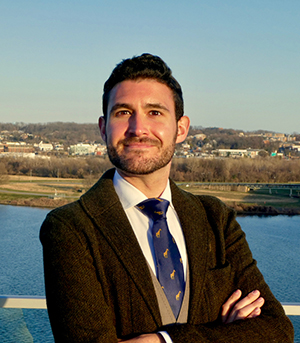New Health Economics Professor Joins International Health

Assistant Professor Bryan Patenaude is a recent addition to the health economics faculty in the Health Systems Program within the Department of International Health at the Johns Hopkins Bloomberg School of Public Health. Previously a senior economist at the United States Agency for International Development (USAID), Patenaude brings a wealth of background experience working on the HIV/AIDS epidemic in sub-Saharan Africa.
As a senior economist for USAID, he served on the Sustainable Financing Initiative and spearheaded a multi-country study in sub-Saharan Africa, examining the use of infrastructure levies to supplement public health financing. Patenaude’s work in this field built upon the World Bank “Transport Against HIV/AIDS” project and documented linkages between HIV transmission and large construction sites due to the migration of construction workers for employment. Patenaude examined expanding the use of levies from donor-funded roads to all forms of large infrastructure projects, such as bridges, dams, mines, and large buildings or complexes to help countries sustainably finance and control the HIV/AIDS epidemic as they further develop.
In addition to his work on infrastructure taxes, Patenaude has examined the efficacy of different incentive structures for HIV/AIDS case-finding and the comparative efficiency of programs for testing at-risk populations. He also managed several sustainable finance projects for USAID, including the development of innovative finance techniques for countries that have limited funds for public investment. Patenaude also conducted economic evaluations of PEPFAR investments, including key populations programming, community health worker scale-up, and first-line HIV drug transition. Prior to joining USAID, Patenaude was a postdoctoral researcher at Harvard studying the equity of public health investments in India and behavioral biases in stated preference studies to assess quality of life. His ongoing work in quality of life utilizes principles from social and cognitive psychology to improve economists’ and policy-makers’ ability to measure quality of life and better compare the impact of investments in mental health vs. physical health.
Patenaude’s research priorities within the health economics field include sustainable health financing, exploring the impact of health investments on both economic development and other non-health areas, behavioral economics and prevention, and studying the equity of health investments. He is currently conducting research on the impact of donor investments in public health, exploring how different types of donor investment and disease focus areas may or may not crowd out or complement domestic investment.
In the fourth term, Patenaude is teaching the course Economic Evaluation IV, which he is developing as part of the new MHS in Global Health Economics degree program. “I love teaching courses that bridge the gap between theory and practice and provide students with tangible modeling skills that can be applied to their own specific interests and, ideally, used to inform policy. I am very excited to be creating this new course which will build on the concepts from Economic Evaluation I-III and give students hands-on experience with some of the more advanced and cutting-edge modeling techniques in health economics,” explains Patenaude.
“Dr. Patenaude brings a novel approach that combines patient preferences, behavioral adjustments and equity issues into cost-effective analysis of public health interventions. His interest in behavioral economics, public health and health systems performance will help us to address pressing health issues in low- and middle-income countries,” says Antonio Trujillo, PhD MPP, an associate professor in International Health and director of the Master’s in Global Heath Economics program.
For more information, visit Patenaude's faculty profile.
